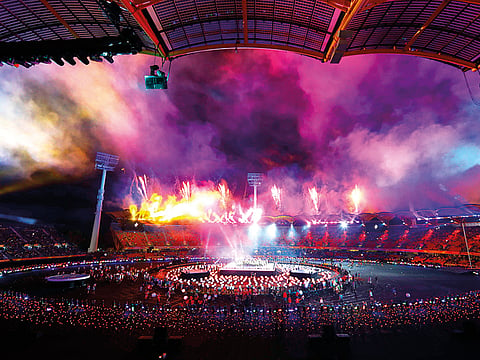Hosts Australia hit 80 golds despite late upsets as Games conclude
We’re pretty disappointed, rugby team coach Walsh says

Gold Coast: After a hugely successful start to the final day of competition, two cruel, late body blows led to an air of opportunity lost for the host nation as the final curtain fell on the Gold Coast Commonwealth Games.
Three marathon wins, followed by another basketball triumph and victory on the squash court took Australia’s gold medal tally to 80, but there it remained thanks to last-minute drama in both the netball and the women’s rugby sevens finals on Sunday afternoon.
Soon after England’s last-gasp efforts on the netball court in Coomera broke Australian hearts, the nation’s sevens team fell to a 17-12 sudden-death extra-time defeat to New Zealand in the final at Robina.
Defeat ended hopes of backing up their Rio Olympic success and compounded the disappointment of the men’s team failing to make the medal matches a day earlier, as New Zealand — who had to settle for silver behind the Australians two years ago — made history by claiming the inaugural Commonwealth title.
Just as England’s Helen Housby had delivered the fatal blow in the netball, it was New Zealand’s Kelly Brazier who stabbed a dagger into Australian hearts in the sevens, running almost 60 metres to settle the contest. The Kiwis had earlier jumped out of the blocks, assuming a commanding 12-o half-time lead thanks to Portia Woodman and Michaela Blyde tries, only for Australia to hit back through Emilee Cherry and Ellia Green and send the match into extra-time.
Australia coach Tim Walsh, in his last game in charge before moving across to the men’s side, attempted to temper his disappointment with the fact that the sport’s Commonwealth debut has been a roaring success.
“We hate losing. We’re pretty disappointed,” Walsh said. “Everyone’s faces are devastated. You can’t fault the effort they put in. They were prepared to perform so they could walk off without any regrets. We don’t like losing and I’m sure there’s always going to be a ‘what if, what if’.”
“To be honest it was a top game for people to watch. Australia versus New Zealand, extra-time, is pretty good. The stadium in Rio was nothing [as exciting] like this. What a spectacle and how good is it for women’s sevens to play like that. It’s a huge step forward. Every country represented themselves really well.
“Women’s sevens is here to stay. All these teams have contributed to giving a whole new genre in women’s contact sport.”
Earlier, champion para-athlete Kurt Fearnley, one of the faces of these Games, bowed out of international racing after claiming gold in the first event of the day with a Commonwealth record for the T54 marathon.
The two-time Paralympic marathon champion, who also won silver in the T54 1,500m, said he was ready to call time. “I’m grateful actually [to be retiring] That just hurt. I busted myself out there, I’ve got nothing, I’ve just got nothing [left] that’s positively everything I’ve got.
“I want to wake up and not feel ruined. The intensity that you take into training when you know you’ve got to compete for this country. You know that whenever you put on the green and gold, you’ve got to be fierce. I just know that I’m done there.”
David Palmer also bid farewell to his career on a high note, winning the men’s doubles squash title with Zac Alexander with victory over England’s Daryl Selby and Adrian Waller at Oxenford Studios.
The final day haul means Australia end their home Games sitting pretty on top of the medal table by some distance, with a total haul of 198 medals comprising 80 golds, 59 silver and 59 bronze. England were their nearest challengers on 45-45-46, with India in third. Canada and New Zealand had 15 golds each.
— Guardian News & Media Limited, 2018

